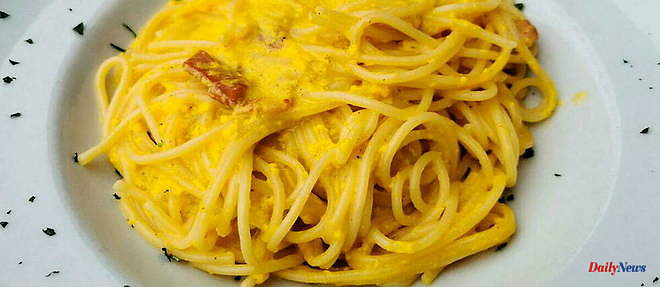He is a historian, specializing in food. He released a best-selling book called Denomination of Invented Origin. But above all, Alberto Grandi is on the way to becoming public enemy number 1 in Italy. In question, his interview in the Financial Times on March 23. In these columns, the historian affirms that monuments of Italian gastronomy would in reality... originate from the United States. Raising of shields and barely veiled anger in the Boot.
From the title, the historian sets the tone: "Everything I thought I knew about Italian cuisine, as an Italian, is wrong". Guaranteeing to have evidence to support his statements, Grandi tackles the classics of Italian gastronomy. "The famous and inflexible Italian food culture, championed by purists and 'gastronationalists'" is, he says, based on "lies, conglomerate recipes or foods imported from America".
Carbonara, for example: the recipes were numerous and "often included ham or mushrooms". The guanciale would not appear until the 90s. The pizza, VRP if there is Italian food, would in fact have been born in 1911... in New York. "Pizza in Naples?" It sucked, it got better in the US. History is not marketing,” he even added. The list goes on: arancini, Sicilian? Impossible: "Rice consumption in Sicily was zero, so no arancini". Tiramisu, an Italian dessert? "No cookbook mentioned tiramisu before 1980."
Even parmesan wouldn't be Italian! “Its history is very distant, millennial, but before the 1960s, the wheels did not weigh more than 10 kilos, compared to around 40 today, and were covered with a thick black crust. Its consistency was also oilier and softer. What most closely resembles the original format? Wisconsin Parmesan,” he describes.
If the attack may seem anecdotal, it was not digested at all in Italy. “We are not touching this heritage. We are trying to discredit our country, "said the Secretary of State for Agriculture. The main Italian agricultural union, the Coldiretti, judges him that this interview is "a surreal attack on the symbol of Italian cuisine".
For good reason: Italian gastronomy is waiting to be classified as a UNESCO World Heritage Site and the ultra-conservative government of Giorgia Meloni has made made in Italy a hobbyhorse. "Italy is losing a lot of its identity and clinging to the kitchen as an element of identity or, some kind of banner, something to be proud of, something to be grotesquely orthodox about," counterattacked the historian.
"What should we expect? If Unesco grants recognition, will a person intending to go to a Chinese restaurant change their mind and go to an Italian restaurant? There are no practical repercussions, it is simply an element of identity and political marketing, which is different from marketing in the strict sense. The risk is that this candidacy will turn into a cultural boomerang for our country, ”he then asserted.
before elaborating on his remarks. “There is one thing that drives me crazy: when I say that over the past fifty years, Parmigiano Reggiano has changed and become an extraordinary product, what am I doing wrong? What damage is being done to the Italian economy and agribusiness? If the cheese is made in Wisconsin like we did a hundred years ago, it's a fault, not a merit for Wisconsin: it doesn't mean it's better than how it's made in Italy. Today. »
And to conclude. “I limited myself to making a philological observation on the origins of parmesan. I understand the needs of marketing, but I do another job, I'm a historian. Perhaps, in the end, those who have criticized me are not so sure of their ideas, so little is enough to plunge them into crisis.












